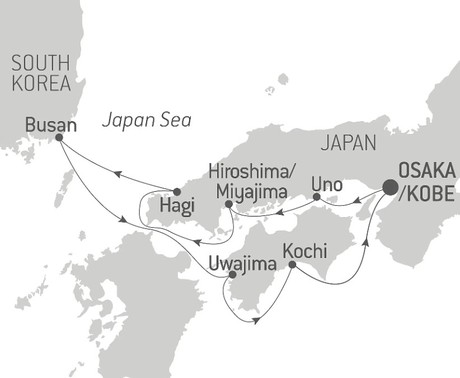Secular Treasures in the Land of the Rising Sun - Japan Luxury Cruise
Gastronomic cruise in partnership with Cuisine et Vins de France, the reference magazine for gastronomy.
Enigmatic and fascinating, traditional and futuristic, the Empire of the Rising Sun invites you on a timeless journey to where the history of the samurai exists alongside the delicateness of the geishas, and where the aromas of the tea plantations intermingle with the scent of cherry blossoms. In the dynamic and bustling city of Osaka, board Le Soléal for a new 8-day cruise to discover this heritage and these ancestral traditions.
Throughout your journey, you will benefit from an excursion included per person per port of call, to choose from a selection offered by PONANT. During this cruise, visit the Peace Memorial from Hiroshima, discover the Itsukushima Shrine from Miyajima Island, or take in the natural treasures of Uwajima. The diversity of experiences on offer promises you intense and varied moments (to discover the full range of excursions, go to the itinerary tab).
After first calling at Uno, Le Soléal will sail towards the western part of the Seto Inland Sea. Hiroshima remains in the world’s imagination as the symbol of the nuclear disaster. Fortunately, like Nagasaki, the city has become one of the archipelago’s most peaceful towns and one of its most attractive. Only the Hiroshima Peace Memorial bears witness to the events that occurred in what is now known as “the City of Peace”. The jagged coastlines of the captivating Miyajima Island, also known as Itsukushima, come into view, and the vermillion Torii of the from Miyajima, Shinto Shrine of Itsukushima, a UNESCO World Heritage Site, unfolds before you in a lush forest setting.
Le Soléal will set sail, on the island of Honshu, to Hagi, the cradle of the samurai and Hagi ware. This town will win you over with its narrow streets, traditional houses, and the former residences of Japanese warriors from this feudal town, whose mythical Shizuki Castle, erected in the 17th century, emerges as a symbol.
Then you will sail to South Korea, a small peninsula that juts out into the Sea of Japan, and discover Busan, South Korea’s second city. A place of great contrasts, Busan offers a spectacular view over its port, as well as over the ancient district of Chalgachi.
Back in Japan, you will sail towards the eastern part of the island of Shikoku. After calling at Uwajima, Le Soléal will set a course for the city of Kochi. Succumb to the charms of this city’s treasures, including lush vegetation, spellbinding caves, an emblematic castle, and ancestral arts and crafts.
Finally, for a grand finale, your journey will end in Kobe, your disembarkation port.
Like its big sister Tokyo, Osaka is the product of ancestral traditions and amazing technological innovations. And despite its size, its location on the Pacific Ocean give it a sense of serenity. The main historic landmark is the 16th century Osaka Castle, which stands proud in the midst of majestic skyscrapers. The lively streets of Dotomburi and the bizarre Shinsekai district attract thousands of locals and visitors. A multitude of restaurants offer menus full of regional specialities: takoyaki, made with octopus, and other succulent dishes such as kushikatsu kebabs.
The small port of Uno, at the southern end of the town of Tamano, provides access both to the city of Okayama and to the "Art Islands" of Naoshima, Teshima, and Shodoshima. In Okayama, Korakuen Garden, considered one of the three best landscape gardens in Japan, invites you to stroll through its expansive lawn and admire its ponds, rice paddies, and waterfall. And Okayama Castle, now completely restored after its destruction during World War II, offers a glimpse of life in 17th-century Japan. Uno itself is a virtual open-air museum with sculptures inspired by the Setouchi Triennale art festival, including the emblematic Chinu-the Black Sea Bream, constructed entirely of waste material that washed up on the shore.
Visiting Hiroshima is a moving experience. The town spreads along Honshu Island, along the inside coasts of Seto. While firmly focused on the future, Hiroshima doesn't forget its past, and a visit to the Peace Memorial Park and Genbaku Dome is a must. You'll enjoy the city's modern, cosmopolitan atmosphere and effervescent nightlife just as much as the peaceful stillness of its natural parkland areas such as splendid Shukkei-en, the town's historic garden.
At the heart of the Inland Sea, Miyajima, the “island sanctuary” will reveal its treasures. In the background you will see the Shinto Grand Sanctuary, whose entrance is guarded by a magnificent vermillion “Torii“. Considered to be one of the most beautiful sites in the Japanese islands, you will be transported by the unique character and the serenity of this sacred site.
In the south of Honshu island, surrounded by mountains, Hagi is a city of water. For good reason; it was built on the delta of the Abu-gawa river. Its castle was built in the 17th century and its outer walls remain in the lovely Shizuki Park. The old town was one of the cradles of the Meiji revolution. You will discover its rich past in streets lined with old houses and samurai manors, or within the walls of the many museums and Hagi-yaki ceramics workshops.
With around four million inhabitants, Busan is the second largest metropolis on South Korea, after Seoul. This dynamic harbour city, located in the south-east, surrounded by the warm waters of the Sea of Japan, benefits from a mild, pleasant climate. You’ll find delightful simply to stroll around the lively streets and explore the city’s outstanding cultural heritage of art galleries, museums, and Buddhist sites, such as the Haedong Yonggungsa temple, which elegantly sits on the waterfront. Rich too in magnificent beaches and superlative natural landscapes, Busan’s peaceful atmosphere will win you over, as will its inhabitants, whom you’ll have the pleasure of meeting.
Located on the west coast of Shikoku island, Uwajima will delight lovers of history and traditional customs. The magnificent Uwajima Castle was built in the 17th-century by the powerful Date clan and has a beautiful ornamental garden and bridge. The much-visited Taga Shrine is dedicated to fertility and is full of phalluses. As for eating, you must taste jakoten, a local delicacy based on fried fish.
The fourth largest island in the Nippon archipelago, Shikoku, is also the best preserved. Here, forests and oceans stretch as far as the eye can see. On the southern coast of the island, Kochi, the tranquil metropolis will quietly welcome you. You can enjoy a lively town, with many commercial centres and restaurants. On the menu, katsuo tataki, a local speciality with delicately grilled fish. But Kochi, overlooked by the benevolent shadow of its castle, also invites you to explore its magnificent Katsurahama beach, its museums and Buddhist temples, the site of a famous annual pilgrimage.
A coastal city on the main island of Honshū, Kobe is a vital Japanese port. You will be inspired by the authenticity, way of life and heritage of the capital of Hyōgo Prefecture, which is bordered by the sea. Its beef is internationally renowned, but there is much more to the city’s attractions than this delicate speciality. As soon as you arrive, you will be welcomed by the Kobe Port Tower, located, along with the Maritime Museum, in the much appreciated Meriken Park. The Mount Rokkō National Park is a real island of greenery in the very heart of the vibrant city. Long frequented by Shinto monks, then popular with the expatriates who flocked to Kobe during the second half of the 19th century, it is one of the symbols of the city.
Itineraries are subject to change.
|
Book now |
Superior Stateroom

DeLuxe Stateroom

Prestige Stateroom - Deck 4

Prestige Stateroom - Deck 5

Prestige Stateroom - Deck 6

Deluxe Suite

Prestige Suite - Deck 5

Prestige Suite - Deck 6

Owner’s Suite

Additional charges:
Port Taxes: 520 AUD pp
Vessel Type: Luxury Small Ship
Length: 142 metres
Passenger Capacity: 264
Built: 2013
Sailing under the French flag, this magnificent yacht of only 132 staterooms and suites, with balconies, joined in 2013. You will be enchanted by the contemporary decor inspired by the luxury yachting world, with fluid lines and a modern colour scheme combining natural wood with shades of grey and white.
A refined ambience is enhanced by the quality of the workmanship and materials: white Corian counters in the lobby contrast with the warmth of leather to recall a boat's hull, while the central scuplture of enamelled pieces takes its inspiration from the sea. In the loungebar, the carpet picks up a tennis stripe theme symbolising a certain idea of cruising, one synonomous with French elegance and a chic seaside spirit.


Special Offers
Up to 30% OFF! Prices online do not show the discounted rates. Terms and Conditions apply, special offer is subject to availability, please contact us for more details.
Inclusions
• Voyage on board in selected cabin category
• All meals while on board
• Non-alcoholic and Alcoholic beverages included (Excluding Premium Brands)
• Free wifi (Subject to coverage)
• Expedition cruises include excursions and zodiac cruises
• Some shore excursions are included, depending on the voyage destination
Exclusions
• Flights other than those mentioned in the itinerary
• Travel insurance
• Passport and visa costs if applicable
• Premium beverages package (Can be purchased on board)
• Optional Excursions where applicable
• Spa treatments on board
• Pre and post cruise accommodation unless otherwise stated
• Transfers unless specified
• Gratuities
Highlights
• Gastronomic cruise in partnership with Cuisine et Vins de France, the reference magazine for gastronomy.• A brand-new cruise to discover the Empire of the Rising Sun, its ancient traditions, its cultural heritage, its natural environments and its emblematic sites.
• Make the most of an excursion included per person per port of call during your cruise thanks to the selection made by our destination experts.
• UNESCO World Heritage Sites: the feudal Hagi, The Miyajima Sanctuary and its vermillion Torii, the Hiroshima Peace Memorial Museum.
• A new port of call, the welcoming city of Kochi.
• Varied landscapes along the Seto Inland Sea, offering stunning contrasts between land and sea.
• The port of call on the island of Uwajima, with its strong feudal past and ancestral traditions.
Our Associates Include







